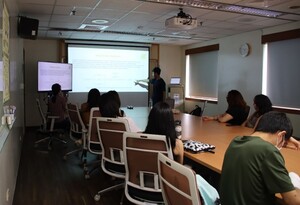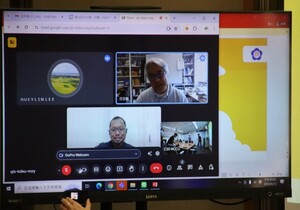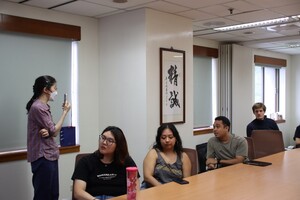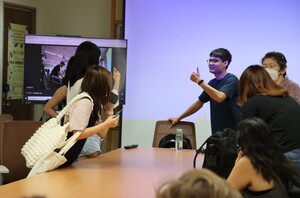Master’s Student from the IMES Programme spoke at the iPlus Workshop on the Role of Renewable Energy and Human Capital in the Global Mitigation of Carbon Emissions




Date :
2024-06-26
Department :
College of Social Sciences
【Article by College of Social Sciences】
On June 12, 2024, the College of Social Sciences (CSS) hosted a workshop called “The Role of Renewable Energy and Human Capital in Reducing Carbon Dioxide Emissions: Exploring the Unexplored from Global Perspectives.” The workshop aimed to encourage postgraduate students to share their research outcomes at any stage of progress. The speaker at the workshop was Muhammad Syukron Mamun, a Master’s student from the International Master’s Program of Applied Economics and Social Development (IMES) from Indonesia. Syukron presented the empirical research findings on this topic, which stemmed from the literature review report he conducted for the “Environmental Economics” course in the fall semester of 2023. It is hoped that new perspectives can be sparked through the workshop discussion to help the researcher advance the study further.
Professor Huey-Lin Lee from the Department of Economics, CSS, chaired the workshop. Two overseas scholars from the field of environmental and natural resource economics were invited to participate online as discussants: Professor Akira Hibiki from Tohoku University, Japan, and Professor Deden Dinar Iskandar from Universitas Diponegoro, Indonesia. They offered valuable feedback to further improve the study.
Syukron presented empirical research findings on the impact of economic development on carbon dioxide emissions, with a focus on the roles of sectoral composition, renewable energy, and human capital across 118 countries from 2002 to 2019. He used the “Stochastic Impacts by Regression on Population, Affluence, and Technology” (STIRPAT) model and the “Environmental Kuznets Curve” (EKC) hypothesis to examine the complex dynamics influencing carbon dioxide emissions.
The study found that agriculture and industrial sectors, as well as trade openness, significantly contribute to carbon emissions. In contrast, the higher the ratio of renewable energy, human capital, and service-oriented industries, the better the mitigation of carbon emissions. The study supports the EKC hypothesis, highlighting an initial escalation in emissions with economic growth, and as income further rises, environmental sustainability gains more weight in consumer preferences, which is conducive to carbon emissions reduction.
A finding from the study revealed the interaction between renewable energy and human capital could lead to emissions increase. Such a counterintuitive result suggests that this research may not have fully captured the complexities involved in transitioning to a sustainable economy and environment. While human capital is typically regarded to complement renewable energy deployment, effective strategic management is essential to prevent a rebound effect in energy demand and ensure that environmental goals are achieved.
The two discussants voiced their professional comments to help further improve the quality of this study. Professor Akira Hibiki recommended Syukron to refer to his article on the EKC study published in 2009 for model specification. Professor Deden Dinar Iskandar praised Syukron for incorporating data from both developing countries and developed countries, highlighting the stark differences in economic development paths among countries. A graduate student from the School of Commerce, National Chengchi University (NCCU) suggested that Syukron may declare the absence of governance indicators in the research scope section before noting it as a research limitation at the end of the paper. Syukron expressed appreciation to the discussants and the audience for helping him further improve the study. In concluding the workshop, Professor Huey-Lin Lee wished Syukron success in completing his Master’s thesis defense this summer and receiving his IMES degree from NCCU.
On June 12, 2024, the College of Social Sciences (CSS) hosted a workshop called “The Role of Renewable Energy and Human Capital in Reducing Carbon Dioxide Emissions: Exploring the Unexplored from Global Perspectives.” The workshop aimed to encourage postgraduate students to share their research outcomes at any stage of progress. The speaker at the workshop was Muhammad Syukron Mamun, a Master’s student from the International Master’s Program of Applied Economics and Social Development (IMES) from Indonesia. Syukron presented the empirical research findings on this topic, which stemmed from the literature review report he conducted for the “Environmental Economics” course in the fall semester of 2023. It is hoped that new perspectives can be sparked through the workshop discussion to help the researcher advance the study further.
Professor Huey-Lin Lee from the Department of Economics, CSS, chaired the workshop. Two overseas scholars from the field of environmental and natural resource economics were invited to participate online as discussants: Professor Akira Hibiki from Tohoku University, Japan, and Professor Deden Dinar Iskandar from Universitas Diponegoro, Indonesia. They offered valuable feedback to further improve the study.
Syukron presented empirical research findings on the impact of economic development on carbon dioxide emissions, with a focus on the roles of sectoral composition, renewable energy, and human capital across 118 countries from 2002 to 2019. He used the “Stochastic Impacts by Regression on Population, Affluence, and Technology” (STIRPAT) model and the “Environmental Kuznets Curve” (EKC) hypothesis to examine the complex dynamics influencing carbon dioxide emissions.
The study found that agriculture and industrial sectors, as well as trade openness, significantly contribute to carbon emissions. In contrast, the higher the ratio of renewable energy, human capital, and service-oriented industries, the better the mitigation of carbon emissions. The study supports the EKC hypothesis, highlighting an initial escalation in emissions with economic growth, and as income further rises, environmental sustainability gains more weight in consumer preferences, which is conducive to carbon emissions reduction.
A finding from the study revealed the interaction between renewable energy and human capital could lead to emissions increase. Such a counterintuitive result suggests that this research may not have fully captured the complexities involved in transitioning to a sustainable economy and environment. While human capital is typically regarded to complement renewable energy deployment, effective strategic management is essential to prevent a rebound effect in energy demand and ensure that environmental goals are achieved.
The two discussants voiced their professional comments to help further improve the quality of this study. Professor Akira Hibiki recommended Syukron to refer to his article on the EKC study published in 2009 for model specification. Professor Deden Dinar Iskandar praised Syukron for incorporating data from both developing countries and developed countries, highlighting the stark differences in economic development paths among countries. A graduate student from the School of Commerce, National Chengchi University (NCCU) suggested that Syukron may declare the absence of governance indicators in the research scope section before noting it as a research limitation at the end of the paper. Syukron expressed appreciation to the discussants and the audience for helping him further improve the study. In concluding the workshop, Professor Huey-Lin Lee wished Syukron success in completing his Master’s thesis defense this summer and receiving his IMES degree from NCCU.


 Fax:886-2-29379611
Fax:886-2-29379611